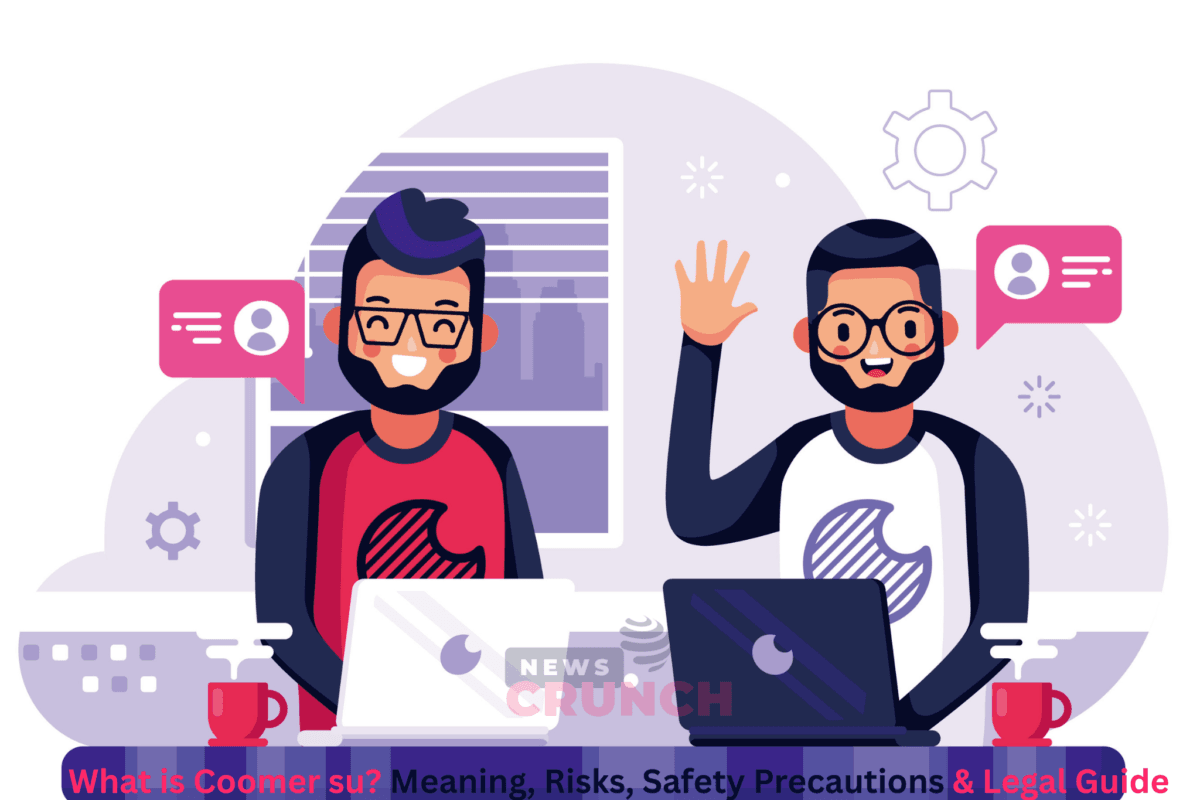
Introduction
Coomer su is a phrase with two meanings depending on the context. On one hand, it is rooted in internet meme culture where the word “Coomer” describes a fictional character representing compulsive adult content consumption. On the other, the term refers to websites often hosted on a .su domain that archive and distribute subscription-based adult material without permission. These sites usually copy content from platforms such as OnlyFans and Fansly, raising serious questions about piracy, cybersecurity threats, and legal violations.
For researchers, creators, and internet users, understanding Coomer su means looking beyond the meme. It requires exploring the cultural background, the technical operations of archive sites, the risks involved for users, and the legal and ethical implications. This article breaks down everything you need to know, from its origins in online communities to the dangers of interacting with Coomer su websites. he term ‘Coomer su’ is not an official brand or platform; it is a phrase commonly used by internet users and media outlets to describe certain websites and cultural discussions. This article is for educational and awareness purposes only, not to encourage access to such sites.
The Cultural Origins of the “Coomer” Meme
The word “Coomer” first appeared around 2018–2019 on internet boards such as 4chan. It depicted a scruffy, hollow-eyed version of the Wojak cartoon, symbolizing someone who spends excessive time consuming adult material online. What began as satire quickly became shorthand for unhealthy online habits and discussions about overexposure to pornography.
This meme gained traction because it mixed humor with criticism, creating a stereotype of individuals who struggle with self-control and internet addiction. Over time, the Coomer identity became linked to debates on mental health, productivity loss, and relationships strained by compulsive behavior. While not intended as a medical term, the meme has often been used to spark conversations about digital well-being.
Thus, when people hear “Coomer su,” they may connect it to this meme. However, in many online searches, the term is strongly tied to websites rather than cultural jokes. To understand the complete picture, we need to explore the website side of Coomer su.
Coomer as a Website Archive
Users searching for “Coomer su” often come across sites that act as content repositories. These archives usually host material from creators on subscription-based platforms. Content is either scraped automatically or uploaded by individuals who once had legitimate access.
The main goal of these archives is simple: to make paid content freely accessible to anyone. Files are organized in searchable categories by creator name, making browsing quick and effortless. While convenient for viewers, this practice is a direct form of piracy, as it bypasses the original payment system that supports the creators’ work.
The consequences extend beyond copyright issues. Visitors to such sites may also encounter intrusive pop-ups, ad tracking, and malicious downloads. Platforms like OnlyFans and Fansly frequently issue takedown requests, but the archives often reappear under new names or domains, creating a problematic cycle to stop.
How Coomer-Style Archives Operate
To understand why Coomer poses risks, it’s essential to examine how these archives function:
- Content Acquisition – Material is either scraped using bots or taken from paid subscribers who reupload it without consent.
- Storage and Indexing – Content is categorized and stored in large databases, making it easy for visitors to navigate.
- Public Access – Anyone can download or view files for free. Many sites rely heavily on ad revenue, often using aggressive or malicious ads.
This operational model is what makes them problematic. They thrive on stolen material while exposing visitors to security risks. Cybersecurity companies have flagged many archives as unsafe environments, making them risky to explore.
The .su Domain and Its Background
The .su domain has a unique history. Initially assigned to the Soviet Union in 1990, it remained active even after the USSR collapsed in 1991. Unlike many other discontinued domains, .su still operates under Russian administration.
Some website owners prefer .su because it has fewer restrictions than other domains. For archives like Coomer su, it is appealing as a hosting option. However, using a .su domain does not automatically mean a website is illegal; it simply signals that the owners are taking advantage of looser regulations.
International regulators like ICANN have debated retiring the .su domain, but so far it remains available. This unusual status makes it a popular choice for controversial websites, including archives of pirated material.
Cybersecurity Risks of Coomer su
Cybersecurity firms such as Malwarebytes have flagged Coomer’s sites as riskware, which may harm users’ devices. Some of the most common dangers include:
- Malvertising – Ads that install malware or redirect to infected websites.
- Clickjacking – Invisible elements tricking users into unwanted actions.
- Malicious files – Downloads that contain harmful software.
Even browsing without downloading anything can expose visitors to dangerous scripts running in the background. This makes Coomer so risky not only from a legal perspective but also from a personal safety standpoint.
Safe Browsing Practices
If you come across a Coomer su site for research or awareness purposes, it is crucial to follow strong safety guidelines. These sites may look harmless, but they can infect your device or steal your data within seconds. To minimize risks, consider these practices:
- Keep your operating system and browser updated so that security patches protect you from known vulnerabilities.
- Use trusted antivirus and ad-blocking tools to block malicious ads, popups, and hidden trackers.
- Avoid logging into personal accounts such as email, banking, or social media while exploring such sites.
- Never download files from unverified sources, since pirated archives often contain trojans or spyware.
- Consider using a separate device or a virtual machine dedicated only to risky browsing. This keeps your main computer and data isolated from threats.
For businesses, this principle is similar to using secure digital tools like CRM systems for small businesses.
Legal Issues Surrounding Coomer su
From a legal perspective, Coomer raises clear concerns:
- Uploading or sharing content without permission is usually a copyright violation.
- Viewing content is less likely to be prosecuted, but downloading or reuploading it can lead to legal action.
- Users may also face bans from platforms like OnlyFans if caught redistributing stolen content.
For creators, the damage is not just financial but also reputational. Piracy undermines their ability to control their work and earn revenue.
Protecting Creators’ Content
Creators face one of the biggest challenges online when their paid content is stolen and distributed through Coomer-style archives. This not only damages their financial stability but also undermines the trust they have built with their audience. However, there are several steps creators can take to defend their work:
- Document all evidence by saving URLs, screenshots, and timestamps of the stolen content.
- Submit DMCA takedown requests to hosting companies, domain registrars, and search engines.
- Use official copyright claim tools provided by platforms like OnlyFans and Fansly.
- Request link removal from Google and other search engines to reduce the visibility of pirated material.
- Seek legal or professional help if the infringement is widespread or continues despite takedown efforts.
This situation highlights the importance of wealth management for digital creators. Protecting online income sources is as critical as traditional financial planning. For example, strategies discussed in guides like Future of the Wealth Management
Ethical and Wellbeing Considerations
The Coomer meme often sparks laughter, but behind the humor lies serious conversation. Compulsive adult content consumption can lead to mental health issues, affect relationships, and reduce productivity.
Equally important is the ethical side of Coomer’s websites. Consuming pirated content disregards creators’ rights and undermines their livelihood. Supporting creators through official platforms ensures fair compensation and respect for consent.
The Wider Archive Ecosystem
Coomer su is only one part of a larger ecosystem of piracy sites. Others, like Kemono, focus on platforms like Patreon or Pixiv Fanbox. They follow the same cycle: stolen uploads, organized archives, takedowns, and eventual reappearance under new domains.
This constant “cat-and-mouse” game means that even if one archive disappears, others quickly replace it. For users and creators alike, awareness and proactive measures are essential to navigate this landscape responsibly.
Conclusion
Coomer su is both an internet meme and a controversial website category. While the meme highlights online behavior humorously, the websites raise serious concerns about piracy, safety, and legality.
For users, the risks of visiting such sites often outweigh the benefits, exposing them to malware and legal trouble. Coomer represents a challenge for creators in protecting their work and maintaining control over their content.
The best approach is to stay informed, browse safely, and support creators through legitimate channels.
Frequently Asked Questions (FAQs)
1. What is Coomer su?
Coomer can mean either a meme about compulsive adult content use or a website archive that republishes subscription-only material without permission.
2. Is Coomer safe to visit?
No, security experts flag it as unsafe. Even browsing without downloads can expose users to malware, pop-ups, or malicious scripts hidden in ads.
3. Is Coomer’s legal?
Operating or uploading to such sites is illegal due to copyright violations. Viewing is less prosecuted, but downloading or sharing may lead to consequences.
4. Why does Coomer use the .su domain?
The .su domain dates back to the Soviet Union. It is still active and often chosen for looser regulations, making it attractive to piracy sites.
5. Can visiting Coomer harm my device?
Yes, malicious ads and files can infect devices with malware. Even passive browsing may expose users to risky scripts and hidden security threats.
6. How can creators protect their work?
Creators should gather proof, file DMCA takedowns, use platform tools, request search engine removal, and consider legal support for persistent piracy.
7. What are the ethical issues with Coomer su?
It undermines consent and creator rights. Consuming pirated content harms income streams and disrespects the labor of online creators.
8. Can I get banned for using Coomer su?
If caught redistributing or downloading pirated content, platforms like OnlyFans or Fansly can suspend or permanently ban your account.
9. What is riskware in relation to Coomer su?
Riskware refers to software or websites that may harm devices. Coomer su is flagged as such because of ads, malware risks, and unsafe downloads.
10. Are there alternatives to Coomer su?
The safe alternative is supporting creators on official platforms like OnlyFans or Patreon, where content is legal, secure, and ethically shared.





